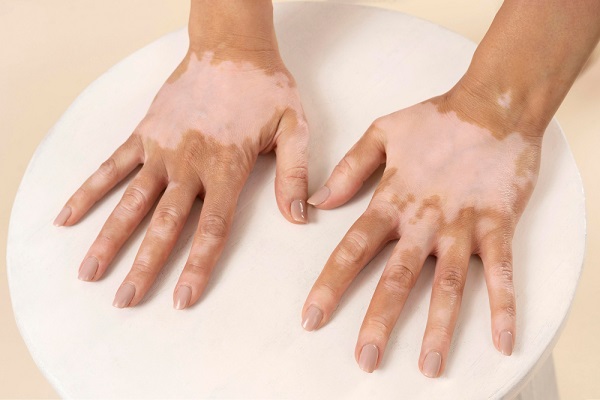Ayurvedic Tips For the Symptoms of Leucoderma
- July 3, 2023
- admin

Leucoderma, also known as vitiligo, is a skin condition characterized by the loss of pigmentation in certain areas of the skin. This can cause white patches to appear, which can be emotionally distressing for those affected.
According to Ayurveda, leucoderma is known as “Shvitra” or “Kilas” in Sanskrit. It is considered a disorder of the skin and is believed to be caused by an imbalance in the body’s doshas, particularly Pitta and Bhrajaka Pitta (a subtype of Pitta that governs the skin). Ayurveda views leucoderma as a manifestation of underlying imbalances in the body, including impaired digestion, accumulation of toxins (ama), stress, and a weakened immune system. These imbalances lead to a decrease or absence of melanin production in certain areas of the skin, resulting in characteristic white patches.
Ayurvedic texts explain that Shvitra occurs due to the aggravation of Pitta dosha and the vitiation of Rakta dhatu (blood tissue) and Mamsa dhatu (muscle tissue). This imbalance disrupts the normal functioning of the skin and melanin production, leading to depigmentation. According to Ayurveda, several factors can contribute to the development of leucoderma, including:
1. Excessive consumption of sour, spicy, and salty foods, aggravates Pitta dosha.
2. Exposure to excessive heat and sunlight leads to Pitta aggravation and skin damage.
3. Emotional stress, anxiety, and mental disturbances can impact the immune system and overall well-being.
4. Impaired digestion and accumulation of toxins in the body, which can affect skin health and pigmentation.
5. Genetic predisposition or family history of leucoderma.
Ayurvedic treatment for leucoderma focuses on addressing the underlying imbalances in the body, purifying the blood, boosting the immune system, and promoting skin regeneration. It involves a combination of internal herbal remedies, external applications, dietary modifications, lifestyle changes, and stress management techniques. The goal is to restore the balance of doshas, enhance digestion, eliminate toxins, and stimulate melanin production in the affected areas.
In this blog post, we will explore six Ayurvedic tips that can assist in managing the symptoms of leucoderma.
Panchakarma Therapy:
Panchakarma is a set of Ayurvedic cleansing procedures aimed at eliminating toxins from the body and restoring balance. It involves techniques such as Virechana (purgation), Vamana (emesis), and Rakta moksha (bloodletting). Panchakarma therapy can help remove accumulated toxins, improve digestion, and enhance the immune system, which may contribute to managing leucoderma symptoms.
Herbal Remedies:
Ayurveda emphasizes the use of herbs and natural ingredients to promote overall well-being. Certain herbs like turmeric, neem, Guduchi, and bakuchi have been traditionally used to manage skin conditions, including leucoderma. These herbs possess anti-inflammatory, immunomodulatory, and skin-regenerating properties that can aid in reducing white patches and promoting repigmentation.
Diet and Nutrition:
Ayurveda places great importance on maintaining a healthy diet to promote balance and healing. For individuals with leucoderma, including certain foods and avoiding others can be beneficial. Foods rich in antioxidants such as fruits, vegetables, and whole grains can help neutralize free radicals and support the body’s natural healing processes. Additionally, incorporating spices like cumin, coriander, and ginger in cooking can aid digestion and promote overall skin health.
Stress Management:
Stress is known to worsen many skin conditions, including leucoderma. Ayurveda suggests stress management techniques such as yoga, meditation, and pranayama (breathing exercises) to help reduce stress levels. These practices promote relaxation, balance the mind-body connection, and support overall well-being. Engaging in stress-relieving activities can contribute to minimizing the progression of leucoderma.
External Applications:
Ayurvedic oils and pastes can be applied externally to the affected areas to nourish the skin and stimulate pigmentation. Some commonly used substances include sesame oil, mustard oil, psoralea oil, and black gram paste. These applications can help improve blood circulation, enhance melanin production, and potentially promote repigmentation in white patches.
Lifestyle Modifications:
Certain lifestyle habits can exacerbate leucoderma symptoms. Ayurveda recommends avoiding excessive sun exposure, as it can lead to sunburns and increase the contrast between pigmented and unpigmented skin. Wearing protective clothing and using sunscreen can help shield the skin. Furthermore, Ayurveda encourages maintaining a regular sleep schedule and avoiding late nights, as inadequate sleep can compromise the body’s healing abilities.
Conclusion:
While leucoderma may not have a definitive cure, Ayurveda offers a holistic approach to managing its symptoms. Incorporating Panchakarma therapy, herbal medicines, maintaining a healthy diet, managing stress, utilizing external applications, and making necessary lifestyle modifications can contribute to managing the condition and promoting overall well-being. However, it is essential to consult with an experienced Ayurvedic practitioner to customize the treatment plan according to individual needs. Remember, consistency and patience are key when implementing Ayurvedic practices for managing leucoderma symptoms.
How to Use Ayurvedic Toners and Cleansers for Acne-Prone Skin
How Ayurvedic Medicine Restores Gut Health for Acid Reflux Patients
How Can We Reduce Flatulence Problems With the Help of Ayurveda?
5 Effective Ayurvedic Herbs for Pleurisy Treatment
The Role of Patanjali Medicine in Preventing & Managing Epistaxis
Disclaimer:
This website is not an official website of Swami Ramdev and Divya pharmacy or Patanjali Yog Peeth, Haridwar. It is a health information website. Authenticity and genuinety of the information mentioned on the above page is purely at the user discretion. We don't claim any cure, relief and other authenticity of the medical and health conditions that are mentioned on the above page. It is always recommended that users of this website should always consult their physician prior to use of this information and products. The products and information listed above is not being evaluated by US FDA. This Website is presented purely at our personal experience and hence we don’t take any responsibility of any sort.









